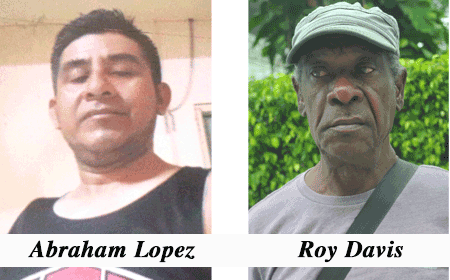Roy Davis has $7,000 headache after signing surety for Guatemalan who absconded
BELIZE CITY, Wed. Nov. 28, 2018– Signing as recognizance for someone whose freedom has been taken away by the criminal justice system is a very serious undertaking, because if the person fails to show up for his/her court case, the court will look to the person who signed as recognizance. The person who signs will either have to put forward the money to pay the court or risk going to prison.
Veteran freelance court reporter, Roy Davis, is walking a thin line between keeping his freedom and going to prison because he signed as recognizance for a Guatemalan man who, when his case came up, only appeared in court once and has since disappeared.
Yesterday morning, Davis appeared in the Supreme Court of Justice Colin Williams along with two attorneys who are representing him in the matter. Justice Williams will rule on the matter on Friday.
About a month ago, when Davis first appeared along with his attorney Herbert Panton, Justice Williams gave him about three weeks to come up with the $7,000 he signed for as surety.
When the matter came up in court yesterday, Davis had additional legal representation from attorney Arthur Saldivar, who made a new submission on his behalf.
Saldivar, upon looking over the bail papers that Davis signed, explained to Justice Williams that his client is in an unfortunate situation, because he ought not to have been the only person before the judge.
Saldivar pointed out to the court that the judge who offered bail to the Guatemalan man had specified $7,000 that was supposed to consist of two sureties of $3,500 each.
“Where is the other person who signed?” Saldivar asked the court, “Only Mr. Davis is before Your Lordship.
Saldivar, moreover, painstakingly pointed out to Justice Williams that something was amiss with the bail, because a $7,000 bail requires land documents and Davis did not put forward any such documents.
Saldivar also explained that Davis was asked to sign the bail by court marshals who did not have to refer the signed document back to the judge who offered the bail—so the judge did not and could not vary the order, he noted.
Saldivar also cited the laws of Belize as it relates to recognizance as well as a number of authorities from cases in other Commonwealth jurisdictions.
As the season of goodwill approaches, Saldivar urged Justice Williams to show mercy on his client who is of humble means and noted that these are especially difficult economic times. He asked the court to make allowance for the fact that Davis could not have signed for the entire $7,000, so if he (the judge) is not inclined to dismiss the matter, which he has the power to do, he could at least reduce the charge to $3,500 and give Davis some time to pay.
On January 22, 2016, Supreme Court Justice Antoinette Moore offered bail to Abraham Lopez, a Guatemalan man who was on remand for a charge of unlawful sexual intercourse. Two court marshals prepared the necessary paperwork for Lopez’s bail and one of them asked Davis to sign. Davis claims that when he signed the paper, the amount that he was signing for was not filled in. After Davis had signed, the marshal allegedly gave him $100.
When Lopez’s case came up before Justice Williams, he appeared in the morning and was to return to court for the afternoon session, but did not show up. Davis later learned that the man he signed to help has since returned to Guatemala.

